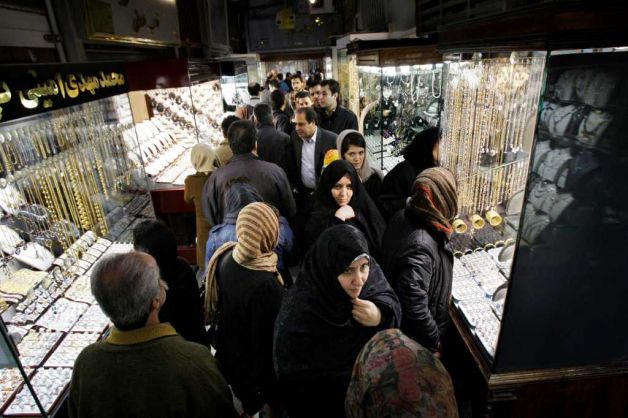Iran Feature: A Middle Class on Edge (Worth)
 Robert Worth reports from Tehran for The New York Times:
Robert Worth reports from Tehran for The New York Times:
One measure of the profound anxiety now coursing through Iranian society can be seen on Manouchehri Street, a winding lane at the heart of this city where furtive crowds of men gather every day like drug dealers to buy and sell American dollars.
The government has raised the official exchange rate and sent police into the streets to stop the black marketeers, but with confidence in Iran’s own currency, the rial, collapsing by the day, the trade goes on.
“Am I afraid of the police? Sure, but I need the money,” said Hamid, a heavyset construction engineer who was standing by a muddy patch of greenery amid a crowd of other illicit currency traders here. “Food prices are going up, and my salary is not enough.” Glancing nervously around him, he added that he had converted almost all of his assets into dollars. Like many Iranians, he had also stockpiled months’ worth of rice and other staples.
The fuel for this manic trade is not an actual economic collapse — the new European oil embargo has yet to take effect, and there is plenty of food on the shelves — but a rising sense of panic about Iran’s encirclement, the possibility of war and the prospect of more economic pain to come. The White House announced a further tightening on Monday aimed at freezing Iranian assets and constricting the activities of Iran’s Central Bank.
Already, the last round of sanctions on Iran’s Central Bank has begun inflicting unprecedented damage on Iran’s private sector, traders and analysts say, making it so hard to transfer money abroad that even affluent businessmen are sometimes forced to board planes carrying suitcases full of American dollars.
Yet this economic burden is falling largely on the middle class, raising the prospect of more resentment against the West and complicating the effort to deter Iran’s nuclear program — a central priority for the Obama administration in this election year.
“For the past few months, our business customers have been coming to us saying their clients are giving up on them, because they believe they will not be paid,” said Parvaneh, a 41-year-old woman working at a Tehran bank. Like others interviewed for this article, she declined to give her full name, fearing repercussions for herself and her family. “They are starting to lay off employees. Iran’s economy has always been sick, but now it seems worse than ever.”
The rising economic panic has illustrated — and possibly intensified — the bitter divisions within Iran’s political elite. A number of insiders, including members of the elite Islamic Revolutionary Guards Corps, have begun openly criticizing Iran’s supreme leader, Ayatollah Ali Khamenei, in recent weeks. One of President Mahmoud Ahmadinejad’s aides indirectly accused Ayatollah Khamenei of needlessly antagonizing the West in ways that pushed down the rial’s value, the latest sign of a rift between the president and the supreme leader that is helping to define the parliamentary elections, which are scheduled for March 2.
“They criticize Ahmadinejad and even the supreme leader by name now; it’s not like before,” said Javad, the 45-year-old manager of a travel agency in north Tehran.
With Iran now importing as much rice and other food staples as it grows at home, trade obstacles could become far more significant in the coming months. Most Iranian traders discount the possibility of real food shortages, saying Iran is already reorienting its trade eastward and has always found ways around sanctions in the past. But with more avenues closing off every month, those evasive measures are likely to be ever more cumbersome and expensive.
Ordinary Iranians complain that the sanctions are hurting them, while those at the top are unscathed, or even benefit. Many wealthy Iranians made huge profits in recent weeks by buying dollars at the government rate (available to insiders) and then selling them for almost twice as many rials on the soaring black market. Some analysts and opposition political figures contend that Mr. Ahmadinejad deliberately worsened the currency crisis so that his cronies could generate profits this way.

 Tuesday, February 7, 2012 at 9:18
Tuesday, February 7, 2012 at 9:18
Reader Comments